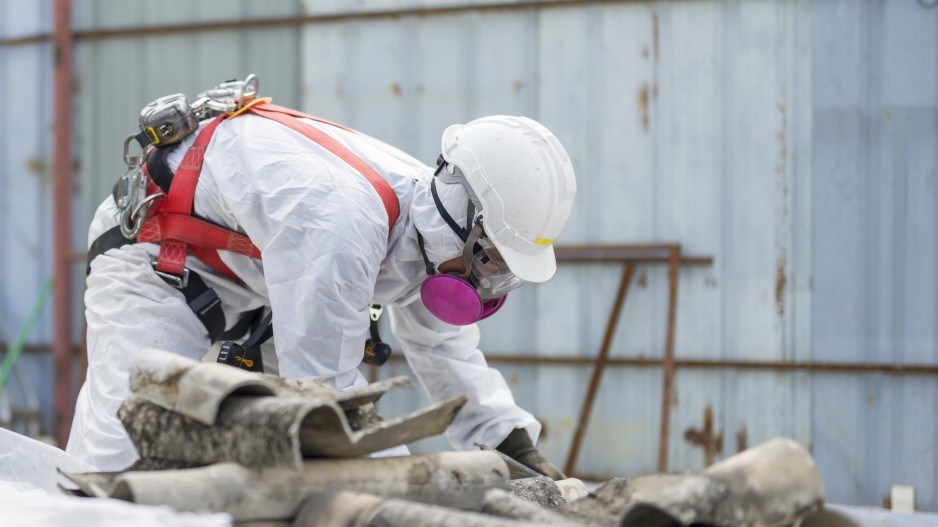Regulatory changes are coming to asbestos work in British Columbia.
As of Jan. 1, 2024, companies that perform asbestos abatement work in B.C. must have a WorkSafeBC licence in order to operate in the province.
In addition, any individual who performs this work will have to be trained and certified.
The new requirements are part of amendments to the Workers Compensation Act that were made in 2022. WorkSafeBC is in charge of developing and administering the licensing and certification regime.
Making, importing, selling and using products containing asbestos is prohibited in Canada. Nevertheless, it can still be found in building materials such as roofing shingles and insulation.
As it ages or when it is disturbed, asbestos breaks down into tiny fibres, which can linger in the air for hours.
Anyone who repairs, renovates or demolishes older buildings in B.C. is at risk of inhaling those fibres. This can damage the lungs and lead to diseases such as asbestosis and mesothelioma, which can end in death.
WorkSafeBC says asbestos is the No. 1 killer of workers in B.C. Between 2013 and 2022, there were 588 deaths due to historical asbestos exposure. About one-third of those who died were construction workers.
Beginning Jan. 1, employers will need to be licensed if they are engaged in asbestos abatement activities such as removing, repairing, transporting or disposing of materials that contain the mineral.
Once they have been licensed, the employers’ names will be added to a registry posted on worksafebc.com.
In addition to being required to have a licence, asbestos abatement employers will need to ensure that their workers are trained and certified for the level of work they are performing.
There are four different levels of training and certification – Level 1, Level 2, Level 3 and Level S – depending on the type of asbestos abatement a worker performs.
The organizations that provide asbestos abatement training must be approved and designated by WorkSafeBC.
One of them is the BC Construction Safety Alliance (BCCSA), a non-profit that provides safety programs and training.
BCCSA programs and initiatives coordinator Sara Knights said the association provides online training for the first two levels, as well as assessment and certification. There are two courses each for Level 1 and Level 2. All courses cost $50 each, are available online and can be completed at a worker’s own pace.
“We are planning to offer additional online training courses for Level 3 and Level S,” said Knights.
Once asbestos workers have registered for training, online courses are available for 60 days. If they have not completed the courses within 60 days, they have to repurchase the courses.
To be certified for Level 1, workers must take the training and pass a written exam. For Level 2, they must also pass an in-person, hands-on skills assessment, which costs $750.
“We are offering sessions all over B.C. for the next few months,” said Knights. “Depending on the location, it could take a few days up to a few weeks to complete the Level 2 requirements.”
Successful applicants will be issued an interim certificate from WorkSafeBC and then a full wallet card, which is valid for three years.
Mary Lovelace, director of prevention divisional services and credentialling at WorkSafeBC, said she expects at least 400 firms that are involved in some aspect of asbestos abatement to come forward and start to go through the licensing process.
“There could be more, too,” she said. “There are many companies in B.C. that do some aspect of asbestos abatement, although it isn’t their main line of work.”
Whether an employer or an individual, Lovelace says it’s important to get started on the application process immediately.
“Begin the process now,” she said. “The licensing and certification applications can take time.”
As of the beginning of October, approximately 100 employers had submitted online applications for licences, and more than 250 workers had received their certification, with many more currently receiving training, Lovelace said.

